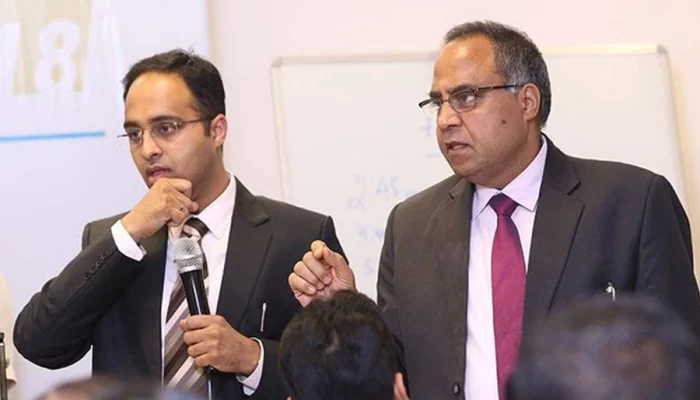India’s hesitancy to partner with US Big Tech can be resolved by Mukesh Ambani

A Google Android smartphone was announced recently in collaboration with Reliance Jio, the telco spearheaded by India’s richest man Mukesh Ambani.
In a June 24 blog post, Google CEO Sundar Pichai wrote that the two companies share a vision “to innovate and build products and services tailored to India’s unique needs, and to empower SME businesses with technology.”. It seems Silicon Valley giants are again seeking support from Ambani to ensure their long-term success in India.
The Free Basics failure
The Google-Jio collaboration is reminiscent of another global giant’s failed attempts to secure India’s massive market: Facebook’s Free Basics project.
It was in February 2015 when Zuckerberg’s company rolled out Internet.org (later Free Basics) in India, a partnership which involved Anil Ambani, Reliance Communications – to improve internet access in India.
As a result of net neutrality activists’ criticisms, Reliance Communications halted the service in December. He wondered out loud, “Who would possibly oppose this?” in an op-ed four days later.”
It’s the Indian telecoms regulator. Instead of subtle, Google-Jio’s push was patently limited by Facebook’s platform. Just 36 sites were bookmarked, and it only offered Facebook as a social network. Local Indian platforms such as hiring site Hiree.com and payments giant Paytm declined to partner with the company.
“The Jio-Google partnership aims to offer consumers affordable smartphones with the Android ecosystem. The internet provider will most likely be Jio, but users should be able to have other providers as well over time,” Yugal Joshi, vice-president at consultancy Everest Group, told Quartz. “Hence, this initiative is much different from the Facebook initiative, where people were more concerned with internet ownership.”
The technology is not as boxed-in as Free Basics, but experts don’t believe Google and Jio will ignore the possibility of pushing their own ecosystem. In India, where big billionaires exert enormous power over the Narendra Modi government, a little nuance and Ambani’s blessings can help.
Google phones with Jio products
The Jio-Google phone will make use of Google Assistant to deliver a great experience with many Jio apps. Users can ask Google Assistant not only about cricket scores or weather conditions, but also about JioSaavn music or checking their Jio balance,” states the June 24 note.
A number of services are available within the Jio ecosystem, from video-on-demand app JioTV to e-grocery app JioMart to JioMoney. Furthermore, Jio offers its own apps for messaging, video conferencing, file sharing, cloud storage, web browsing, apartment security, health monitoring, and online gaming.
Experts believe that Jio’s low prices, along with these bundled apps, will act as a bait for consumers. However, they won’t be openly restrictive. As a result, even though the two forces are joining forces, net neutrality is likely not violated.
Another reason to feel confident about this deal is that it’s less unstable than the Facebook deal of five years ago. In the end, there is a lot of money at stake. Almost 8% of Jio was acquired by Google for $4.5 billion in July 2020.
This partnership is markedly different than the others in the past due to Google’s multi-billion dollar investment in Jio Platforms earlier this year as well as Google’s expansion of Android and other teams within India and teaming up closely with Jio.
The goalposts have shifted for Facebook, which invested $5.7 billion for nearly 10% stake in Jio in April 2020. The goal of bringing Free Basics to India has been abandoned. However, it has other plans.
WhatsApp and Jio’s symbiotic relationship
It looks like Facebook is counting on Jio to secure the future of its messaging service WhatsApp in India.
According to Salman Waris, a partner at legal firm TechLegis, WhatsApp has “long emerged from the shadows of Facebook and is an intrinsic part of Indian consciousness,” despite worries about fake news, Pegasus spyware, and data privacy. “The Mark-Mukesh deal once again underscored WhatsApp’s authority in India. As WhatsApp’s greatest user, and thus Facebook’s greatest user as well, it can be said that that Facebook’s journey in India has been facilitated by the Reliance association.”
Its payments product is the biggest proof of this.
The messaging app began testing payments in India in February 2018, but two years later, it still didn’t have regulatory approval for a full-fledged launch. In April 2020, Ambani began to integrate JioMart on WhatsApp, and a regulatory fire suddenly began to burn.
With just 20 million users in India – just 5% of the total user base – Whatsapp was able to launch payments in November 2020.
As of now, Jio is helping onboard not just customers but also kirana stores (small convenience stores). JioMart is just the beginning. Earlier this year, Jio began offering a recharge service on WhatsApp, too.
According to Waris, Reliance and Facebook have a “symbiotic relationship”. According to him, Reliance aims to leverage WhatsApp’s massive influence in India, while Facebook wants to use Reliance’s customer base to expand its digital payments features through WhatsApp. “Facebook may also be looking forward to collaborating with an Indian household name in an attempt to avoid the scrutiny Free Basics attracted.”
In India, global giants are learning that traveling alone is difficult. Particularly since the Chinese government banned over a hundred apps last year and took American behemoths like Google and Amazon to court for antitrust violations. There has been a growing call for protectionist measures, so currying favor with Ambani is beneficial. No matter what changes in the laws may bring, American companies should be able to maintain their share of the market when he is by their side.








